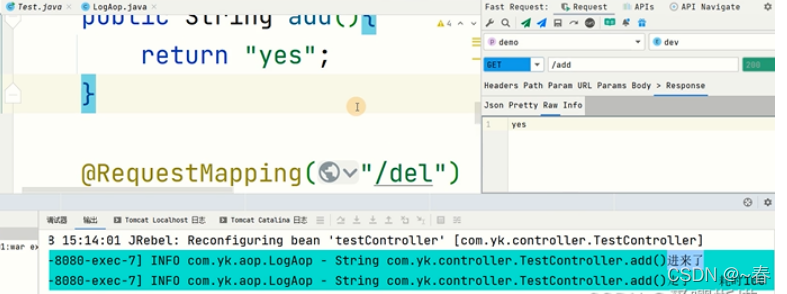一、SpringBoot自定义注解
- Java注解是附加在代码中的一些元信息,用于一些工具在编译、 运行时进行解析和使用,起到说明、配置的功能
1、JDK基本注解
@Override ——》重写
@Deprecated ——》已过时
@SuppressWarnings(value = "unchecked") ——》压制编辑器警告
2、JDK元注解
2.1、@Retention
@Retention(RetentionPolicy.SOURCE)
@Retention(RetentionPolicy.CLASS)
@Retention(RetentionPolicy.RUNTIME)
2.2、@Target
- 指定被修饰的Annotation可以放置的位置(被修饰的目标)
@Target(ElementType.TYPE) ——》接口、类
@Target(ElementType.FIELD) ——》属性
@Target(ElementType.METHOD) ——》方法
@Target(ElementType.PARAMETER) ——》方法参数
@Target(ElementType.CONSTRUCTOR) ——》构造函数
@Target(ElementType.LOCAL_VARIABLE) ——》局部变量
@Target(ElementType.ANNOTATION_TYPE) ——》注解
@Target(ElementType.PACKAGE) ——》包
注:可以指定多个位置
@Target({ElementType.METHOD, ElementType.TYPE}),也就是此注解可以在方法和类上面使用
2.3、@Inherited
2.4、@Documented
- 指定被修饰的该Annotation可以被javadoc工具提取成文档
二 、自定义注解开发
2.1、@interface关键字
Annotation的成员变量,在Annotation定义中是以无参的方法形式来声明的。
其方法名和返回值类型定义了该成员变量的名字和类型。
我们还可以使用default关键字为这个成员变量设定默认值。
2.2、生成一个注释
package com.lv.annotation;
import org.springframework.beans.factory.annotation.Autowired;
import java.lang.annotation.*;
@Documented
@Target({ElementType.TYPE,ElementType.METHOD})
@Inherited
@Retention(RetentionPolicy.SOURCE)
public @interface MyAnnotation {
String message() default "aaa";
}
2.3、取注解里的属性值
public class Test {
public static void main(String[] args) {
for(Annotation a:TestController.class.getAnnotations()){
if(a instanceof MyAnnotation){
System.out.println(((MyAnnotation) a).message());
}
}
}
}
- MyAnnotation注解为@Retention(RetentionPolicy.RUNTIME)时,注解会在class字节码文件中存在,在运行时可以通过反射获取到
public class Test {
public static void main(String[] args) {
for(Annotation a:TestController.class.getAnnotations()){
System.out.println(a);
}
}

2.4、 判断在该类有无该注解
public class Test {
public static void main(String[] args) {
MyAnnotation myAnnotation=TestController.class.getAnnotation(MyAnnotation.class);
if(myAnnotation !=null){
System.out.println(myAnnotation.message());
}
}
}
三 、完成切面日志操作
3.1 、当我们在写增删改的时候,会有很多冗余的代码
@RequestMapping("/add")
public String add(){
System.out.println("xxx在增加");
System.out.println("增加成功");
return "yes";
3.2、定义aop面向切面
package com.lv.aop;
import org.aspectj.lang.ProceedingJoinPoint;
import org.aspectj.lang.Signature;
import org.aspectj.lang.annotation.Around;
import org.aspectj.lang.annotation.Aspect;
import org.aspectj.lang.annotation.Pointcut;
import org.springframework.stereotype.Component;
@Aspect
@Component
@Slf4j
public class LogAop {
@Pointcut("execution(* com.lv.controller.*Controller.*(..))")
public void logger(){}
@Around("logger()")
public Object around(ProceedingJoinPoint point){
Signature methodName=point.getSignature();
log.info(methodName+"进来了");
Long l1=System.currentTimeMillis();
Object obj=null;
try {
obj=point.proceed(point.getArgs());
} catch (Throwable throwable) {
throwable.printStackTrace();
}
log.info(methodName+"走了"+"\t耗时"+(System.currentTimeMillis()-l1));
return obj;
}
}
package com.lv.controller;
import com.lv.annotation.MyAnnotation;
import org.springframework.beans.factory.annotation.Autowired;
import org.springframework.stereotype.Controller;
import org.springframework.web.bind.annotation.RequestMapping;
import org.springframework.web.bind.annotation.RestController;
@MyAnnotation
@RestController
public class TestController {
@RequestMapping("/add")
public String add(){
return "yes";
}
@RequestMapping("/del")
public String del(){
return "yes";
}
@RequestMapping("/upd")
public String upd(){
return "yes";
}
@RequestMapping("/list")
public String list(){
return "yes";
}
}

3.3 、注解来开发aop日志
package com.lv.annotation;
import java.lang.annotation.*;
@Inherited
@Documented
@Target(ElementType.METHOD)
@Retention(RetentionPolicy.RUNTIME)
public @interface MyLog {
}
- 需要输出日志的方法就将新建的注解加上

| 


